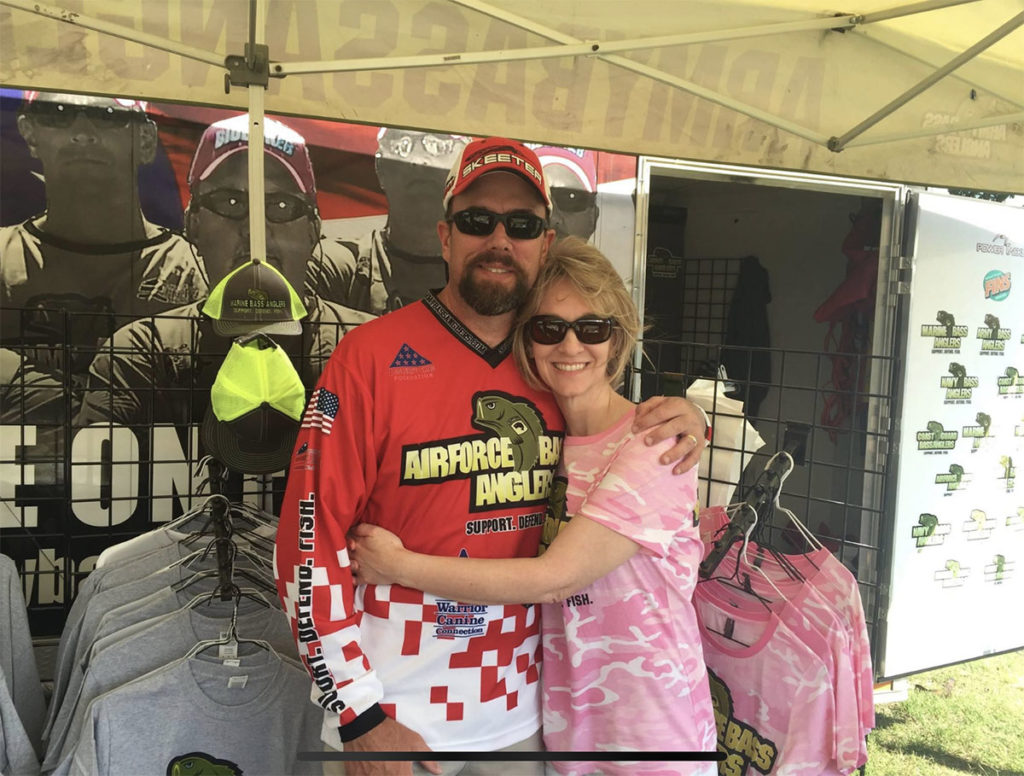
Mike and Leanne Carroll
Leanne Carroll shares her husband’s painful NET journey and hopes it is more than a cautionary tale for newly diagnosed NET patients.
After Leanne lost her husband of 31 years to pancreatic neuroendocrine cancer (pNETs), she sold his most beloved possession, a Bass boat, and donated half of the proceeds to NETRF. Leanne, her son Justin and their family and friends have raised more than $35,000 in Michael’s name for NETRF. She shares their story, below.
“He was our world.”
Mike Carroll was an Air Force Veteran who loved the outdoors, fishing, and most of all, his family.
“We were his world, and he was ours,” said his wife, Leanne.
“Michael was dealing with occasional heartburn, GERD, pain in his upper chest quadrant, A-Fib, periods of constipation, flushing, sweating, etc., at times and doctors couldn’t figure out what was going on; we referred to these occurrences as his “episodes.” After a routine colonoscopy, he had an episode, and I took him back to the doctor’s office and convinced him to do an endoscopy as well.”
“I remember thinking about Mike’s uncle who died from pancreatic cancer having had similar symptoms, so I asked the doctor if he thought maybe Mike’s pancreas was causing these episodes. That doctor was incredibly dismissive; he kind of rolled his eyes and shrugged it off with a resounding “no” as if he didn’t appreciate me trying to make suggestions or be an advocate for my husband,” said Leanne.

“Trust your gut”
In the spring of 2015, Leanne and Mike transferred to Germany for Mike’s job with the Defense Logistics Agency. “He had an extensive physical as part of the conditions for employment, and aside from some small, manageable issues, was given a clean bill of health and approved to move. Our son Justin was in college and beginning his adult life, so this was our time together – our next great adventure,” she said.
It turns out, Leanne was right.
“If I can offer any advice to anyone, it is to trust your gut. Listen to your intuition and speak up as many times as you can. I wish I had and didn’t let that initial doctor intimidate me; it haunts me every day,” she said.
“Once in Germany, we’d been to the Emergency Room a number of times as Mike’s episodes continued. The radiologist who read Mike’s initial CT scan in early September, 2016, didn’t mention the mass he saw on the scan. On our final ER trip mid-September, the attending physician said the radiologist noted the mass had grown in that short amount of time and noted the cells appeared to be adenocarcinoma of the pancreas (pancreatic cancer). No one ever told us about the mass to begin with, so we were shocked. The attending physician suggested we go stateside for treatment.”
Within days, Michael and Leanne were on a C-17 med flight back to Walter Reed Army Medical Center where Mike (who at the time was 50) received a definitive diagnosis of a high-grade, poorly-differentiated pNET; he underwent a Whipple procedure to remove the tumor on his pancreas and began chemotherapy treatments shortly thereafter.
“By March 2017 the radiologist declared him cancer free. We were ecstatic.”
At his next scan, just three months later, the news was devastating.
“The doctor called and let us know ‘the cancer is back, and it is not good. We reviewed the scan from March and can see now that the tumor was present then.’ So, this was the second time a radiologist missed his tumor,” said Leanne.
“At this point we were still pretty much in the dark about this disease,” said Leanne. “There were no NET specialists in San Antonio (where they lived) so we ended up traveling twice a month to the Cancer Treatment Center of America in Newnan, Georgia. It was exhausting and taxing, but Mike never complained. He was so positive, strong, had so much life to look forward to and desperately wanted to beat this.”
“One of the things I insisted he do as we made a plan to live with this diagnosis was to buy the boat he always wanted. If the universe was telling us anything, it was to live life now to the fullest. So, he did, he lived courageously, bought the boat and made so many great friends and memories fishing with his beloved Army / Air Force Bass Anglers.”
“Watching Michael over the years, I don’t know how he did it, but I know he was definitely fueled by his courage and strength; he wanted to live – he’d tell me all the time ‘I don’t want to leave you,’ and I simply couldn’t imagine my life without my Michael.”
Michael passed away in June of 2020.
“It was the honor of my life to be his wife. Michael always put me and our family first. He was an amazing man and we were so fortunate to have spent what time we had together. Now, Justin and I will continue to honor his life and legacy by doing whatever we can to support NETRF and raise awareness about this disease, hopefully helping someone along the way.”
